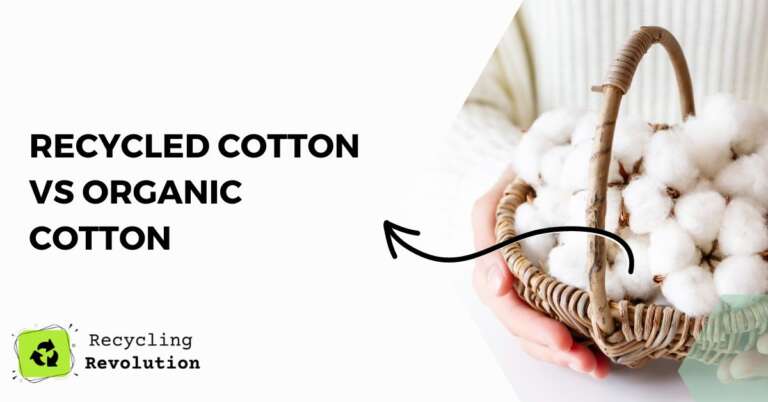When you’re shopping for clothes, you may encounter terms such as “recycled cotton” and “organic cotton”. At first glance, they both seem to imply some form of sustainability, but what do they really mean?
More importantly, how do they stack up against each other?
TL;DR: In the realm of sustainable fashion, both recycled and organic cotton have their merits and drawbacks. Recycled cotton reduces waste and conserves resources but may face quality issues, while organic cotton provides a high-quality fabric without toxic chemicals, though it demands more water. The choice between them depends largely on individual preferences, ethical stances, and environmental priorities.
The Characteristics of Recycled Cotton
Recycled cotton, also known as regenerated cotton, is created by salvaging post-industrial and post-consumer cotton waste. This technique presents a chance to reduce overall waste, saving valuable resources.
The Advantages of Recycled Cotton
- Waste Reduction: Recycled cotton uses materials that would otherwise end up in a landfill. This also means less cotton needs to be grown, leading to a decrease in pesticide use and water consumption.
- Energy Conservation: The process of recycling cotton consumes less energy than producing virgin cotton, resulting in lower carbon emissions.
However, recycled cotton isn’t without its disadvantages.
The Downsides of Recycled Cotton
- Quality Concerns: The recycling process shortens cotton fibers, which can lead to a fabric that’s less durable and feels rougher to the touch.
- Limited Availability: Recycled cotton is not as readily available as other types of cotton, which may restrict its use in the fashion industry.
Delving into Organic Cotton
Organic cotton is grown without harmful pesticides, genetically modified organisms (GMOs), or synthetic fertilizers, resulting in a safer product for both the environment and the end consumer.
The Pros of Organic Cotton
- Chemical-Free Production: Organic cotton is grown using methods that don’t harm the environment with toxic chemicals.
- Better for Farmers: Farmers who grow organic cotton aren’t exposed to dangerous pesticides, improving their health and working conditions.
On the flip side, organic cotton comes with its own set of challenges.
The Cons of Organic Cotton
- High Water Consumption: Although some organic farms use water more efficiently, overall, cotton is a thirsty crop, and growing it organically doesn’t change this.
- Expensive: Organic cotton tends to be more costly to produce, which can make products made from it pricier for consumers.
Which is better Recycled Cotton or Organic Cotton
Here is a brief comparison table that summarises the main characteristics of recycled and organic cotton.
| Recycled Cotton | Organic Cotton | |
|---|---|---|
| Waste Reduction | Excellent | Average |
| Energy Use | Low | High |
| Quality of Fabric | Average to Below Average | High |
| Availability | Limited | Good |
| Cost | Average to Below Average | High |
| Impact on Farmers | Not Applicable | Positive |
Economic Impact
Recycled Cotton
The potential economic benefits of recycled cotton are significant. A thriving market for recycled cotton could create jobs in waste management, sorting, and processing. I recommend supporting businesses that use recycled cotton, as it not only helps the environment but also stimulates economic growth in these sectors.
Organic Cotton
Organic cotton farming could potentially stimulate local economies. The process requires more manual labor, creating job opportunities. Furthermore, because it doesn’t rely on synthetic pesticides and fertilizers, it could help local communities develop organic farming skills, which can be applied to food crops as well, promoting food security.
Production Processes
Recycled Cotton
The process of producing recycled cotton involves collecting cotton waste, sorting it by color, and then shredding it to create cotton fibers. These fibers are then spun into yarn, which can be used to produce new products.
I recommend checking the labels on clothes and home goods to see if they’re made from recycled cotton to encourage this sustainable process.
Organic Cotton
The production of organic cotton involves growing the cotton plant without synthetic fertilizers or pesticides, reducing pollution from agricultural runoff. The cotton is then harvested, cleaned, and spun into yarn.
Organic cotton products are often produced with fair trade practices in mind, supporting workers’ rights and fair wages.
Care and Maintenance
Recycled Cotton
As recycled cotton tends to be less durable, it may require more delicate care. Avoiding harsh detergents and high temperatures when washing can help extend the life of recycled cotton items.
Organic Cotton
Organic cotton is a robust and high-quality fabric, but like any cotton product, it benefits from gentle care. Use mild detergents, and consider line drying instead of using a dryer to preserve the fabric’s integrity and softness.
Note: Both recycled and organic cotton are more environmentally friendly than conventional cotton. By making mindful choices in the products we buy, we can all contribute to a more sustainable fashion industry.
Expanding on Quality and Availability
Recycled Cotton
While the quality of recycled cotton can vary, advancements in recycling technologies are continually improving it. While its availability may currently be limited, consumer demand can drive its increased production.
Organic Cotton
Organic cotton is recognized for its superior quality and is increasingly becoming available as more brands incorporate sustainability into their ethos. I recommend looking for certifications such as GOTS (Global Organic Textile Standard) to ensure you’re purchasing genuinely organic cotton.
In the end, both recycled and organic cotton have unique advantages and disadvantages, and the choice between the two will largely depend on individual preferences and the specific context in which the fabric is being used. The important thing is to stay informed and make the choice that aligns best with your personal values and the needs of our planet.
Conclusion
Recycled cotton comes from old clothes and stuff, turning waste into new fabrics. This is great for not making more trash, but sometimes the fabric isn’t as strong. Organic cotton is grown without bad chemicals, making it safer for the earth and people who farm it.
It can be softer and last longer, but it usually costs more and needs a lot of water to grow. Both types help the planet in different ways, so when you shop, think about what matters most to you and choose the kind of cotton that fits best with your way of helping the Earth.
FAQs
Is recycled cotton the same as organic cotton?
No, recycled cotton is made from post-consumer or post-industrial cotton waste, while organic cotton is grown without harmful chemicals.
Which is better for the environment, recycled cotton or organic cotton?
Both have environmental benefits. Recycled cotton helps reduce waste and conserve energy, while organic cotton eliminates the use of toxic chemicals in its production.
Why is recycled cotton less durable?
The recycling process shortens the cotton fibers, making the resulting fabric less durable.
Note: As consumers, our choices can drive demand for more sustainable practices in the fashion industry. By choosing recycled or organic cotton, we are voting for a more environmentally friendly world.

